
The State of DIY Music: A Roundtable Discussion
The State of DIY: A Roundtable Discussion was a public event held August 4, 2024, at the Lilypad in Cambridge, Mass.
Hardcore Community at Furnace Fest
IASPM-US conference panel (2024). In 2023, our six-member team was on site in Birmingham, Alabama for five days, building upon over two years of prior research in 2021 and 2022. In this panel, four fieldwork team members share their findings along distinct themes. Together, we explore the ways in which community is substantiated and maintained at Furnace Fest.

Author Meets Critics: Andrew Mall’s God rock, Inc.
AAR (2023) “author meets critics” panel on God Rock, Inc. Panelists will consider how Christian music as a niche business shapes religious communities in the United States (and beyond), as well as how its many genres and subgenres - pop, rock, metal, rap, hip hop, praise and worship, etc. - reflect and shape evangelical Christian politics, practice, and theology.

Ethnographic Research and the Study of Christian Music
SCSM conference roundtable panelist (2022). The recent turn to ethnography in various disciplines has prompted renewed reflection on the basis of knowledge for scholars of religious music. Join us for a rousing conversation on the role of ethnomusicology and both its contributions and limitations in the study of religious musicking.

Recent Books on Christian Music
Popular Music Books in Process roundtable presentation (2021). Nathan Myrick, Marcell Silva Steuernagel, and myself discussed our recent books in conversation with each other as part of the PMBiP series of author talks, co-sponsored by IASPM-US, JPMS, and the Popcon.
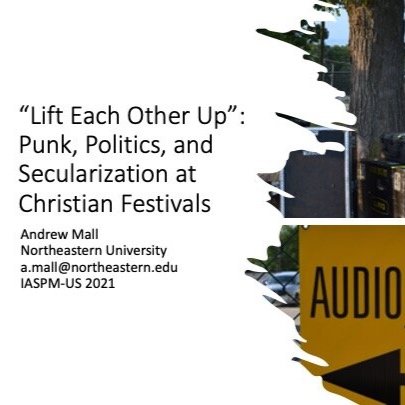
“Lift Each Other Up”: Punk, Politics, and Secularization at Christian Festivals
IASPM-US conference presentation (2021). When the members of Flatfoot 56, a Celtic punk band from Chicago, speak of “brotherhood” at AudioFeed, a Christian music festival, they refer to congregational cohesion; at a secular punk venue, however, scene unity is just as likely an interpretation. Whereas Christian punks sacralize secular places, such as the bars and nightclubs where they often perform, this paper suggests that bands like Flatfoot 56 might be thought to secularize sacred places (i.e., Christian festivals) by decentering U.S. evangelicalism’s most controversial public positions. Through an ethnographic analysis of Flatfoot 56 performances, considering what is sung/spoken aloud and what is not, this paper argues for a nuanced, mediating perspective that recognizes an ambivalence about identity politics among many evangelical subculturalists moving between secular and sacred spaces.
The Future of Pop: Big Questions Facing Popular Music Studies in the 21st Century
AMS pre-conference symposium (2019). Despite the normalization of popular music studies over the last 50 years, complex questions linger about the state of the field and the directions it will take. “The Future of Pop” fostered interdisciplinary collaborations between scholars of different ranks and diverse backgrounds by encouraging conversations about the future of popular music studies.

“As for me and my house”: Nashville, the Home of Christian Music
IASPM-US roundtable (2018). For this roundtable, current and former Christian music professionals who have worked in A&R, executive leadership, higher education, music ministry, publishing, and radio promotions, among other roles, address the unique challenges that face Christian music. With many combined decades of experience in organizations large and small, our panelists are well-attuned to the city’s centeredness to the Christian music industries. We consider how Christian music has impacted Nashville, address the difficulties of maintaining a profitable business while conducting a ministry, and consider the boundaries of Christian music—increasingly porous as they are—in the broader contexts of globalized entertainment.

Sound as Religion
AAR conference roundtable panelist (2017). While interdisciplinary interest in the phenomenon of sound has been growing apace, understanding the diverse ways in which sound is implicated in religious practice and spiritual experience remains under-researched in the field of religious studies. This lacuna can be attributed in part to the dominance of textual, visual, and liturgical paradigms in the field, but also the challenges of conducting research on sound (including music), noise, and silence. At this juncture, we feel the need to team up and share resources in order to promote more research and theoretical reflection on the auditory and acoustic dimensions of religion.

Resistance, Renewal, and Congregation at Christian Music Festivals
AAR conference presentation (2017). Based on interviews with festival staff and attendees, historical research, ethnographic fieldwork at Cornerstone in 2009–2012 (including two summers volunteering as festival staff), and fieldwork at AudioFeed and Wild Goose in 2017, this paper examines the production of space, place, and community at Cornerstone, AudioFeed, and Wild Goose.
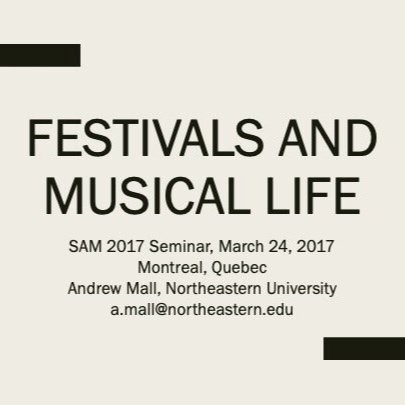
Festivals and Musical Life
SAM seminar (2017). In this seminar, we examine the multiple ways in which festivals—understood as music communities (or scenes) concentrated into limited temporal and geographic frames—affect musical life in the Americas at the micro and macro levels, both historically and in the ethnographic present. Seminar participants should be prepared to present case studies that investigate and discuss the cultures, histories, values, and spaces developed in music festivals in the Americas.
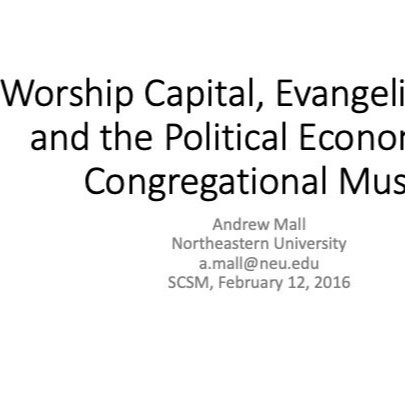
Worship Capital, Evangelicalism, and the Political Economy of Congregational Music
SCSM conference presentation (2016). Building upon the works of Pierre Bourdieu, analyses of music industries, and contemporary discourses of intellectual property, this paper outlines a theoretical framework for the political economy of worship music and considers barriers to integrating this framework into our scholarship and practice. This research emerges from several years of ethnographic fieldwork at the Anchor Fellowship, a non-denominational evangelical church in Nashville, Tennessee, and advances the concept of “worship capital” to capture the various ways in which individuals and institutions invest in worship.

Music Festivals as Scenes: Producing Ephemeral Space Annually at Cornerstone Festival
SEM conference presentation (2015). Based on interviews with festival staff, historical research, and ethnographic fieldwork in 2009–2012—including time working on the festival’s setup, stagehand, and teardown crews—this paper examines the production of space and place at Cornerstone Festival. In doing so, it contributes a vital link between scene theory and the growing ethnomusicological literature on festivals.
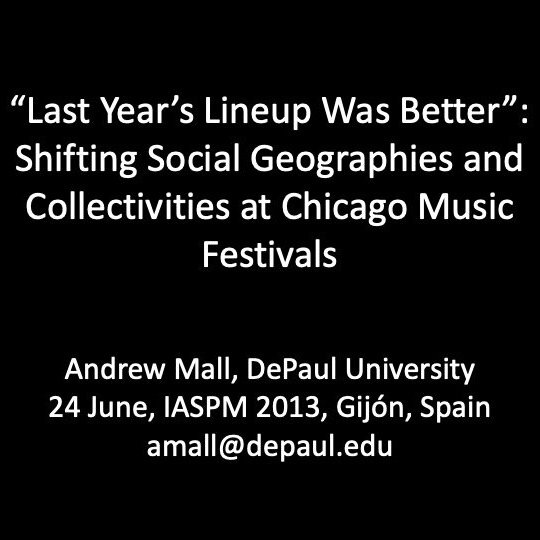
“Last Year’s Lineup Was Better”: Shifting Social Geographies and Collectivities at Chicago Music Festivals
IASPM conference presentation (2013). Drawing on many years of ethnographic research in Chicago, Illinois, this paper compares and contrasts several civic and commercial popular music festivals, such as Blues Fest, Cornerstone, Jazz Fest, Lollapalooza, and Pitchfork. I use mutable, multi-dimensional center-periphery theory to illustrate and explain the social flows within festival spaces, the differentiating strategies of festivals, and the compromises that emerge when organizers reconcile their needs with their audiences’ expectations. In examining the intersecting and overlapping representations of mainstreams and undergrounds at music festivals, my paper contributes to research on the political economies, social geographies, and taste communities of popular music events.
“We Are Called Here to Worship Together”: Ethnographic Outsiderness and Insiderness in Religious and Popular Culture
SEM conference presentation (2012). In this paper, based on several years of ethnographic research at the Anchor Fellowship, I address the challenges of fieldwork as a religious outsider and cultural insider. In constructing a rich description of an Anchor worship service based on my observations, those of church-goers, and formal interviews of Anchor pastors, this paper confronts the multivalence of experience and the interpretation thereof, demonstrating the importance of phenomenology to ethnography of religious and popular cultures.
The Price of Profit? Changing and Challenging Priorities in the Christian Recording Industry
SEM conference presentation (2011). In this paper, I examine EMI Christian Music Group (CMG), a major Christian record label (and division of EMI Ltd.), headquartered near Nashville, Tennessee. I provide a value-neutral analysis of the intersections of commerce, aesthetics, and theology. As with Keith Negus’s (1992, 1999) ethnographic research within the recording industry, my study illustrates that major record label practices and priorities are more nuanced than may be visible to outside observers.

Lost in the Sound of Separation: Mainstreams and Alternatives at a Christian Rock Festival
SEM conference presentation (2009). How do the performers, mediators, and listeners of alternative Christian rock negotiate these multiple tensions? How can their negotiations contribute to existing conceptions of mainstreams and alternatives? Describing the lived experiences of Cornerstone participants requires a perspective more subjectively nuanced than the strict dichotomies of previous models. In working through these ideas, this ethnography studies the ways in which Cornerstone contributes to participants’ self-conception of their Christian lifestyle: mainstream, alternative, and in-between.
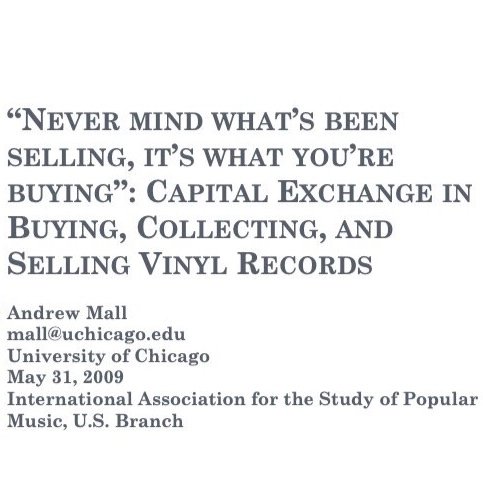
“Never Mind What’s Been Selling, It’s What You’re Buying”: Capital Exchange in Buying, Collecting, and Selling Vinyl Records
IASPM-US conference presentation (2009). Who holds the upper hand at record fairs? The dealers sell the commodities, yes, but the collectors decide what to buy, from whom, and (often, via bargaining) for what price. While dealers frequently self-identify as collectors, interactions between dealers and collectors necessarily rely upon the commodity status of music recordings and their role in the exchange of economic, cultural, and social capital. Through ethnographic research at Chicago-area record fairs, I explore the tensions between record dealers and record collectors, and investigate the ways in which capital and exchange contribute to musical meaning.

Steady Diet of Nothing: Affinities, Sacrifices, and Change at Record Fairs
SEM conference presentation (2006). Building on Will Straw’s confluence of cosmopolitanism (“attentiveness to change occurring elsewhere”) and connoisseurship in his study of communities within popular music, this paper explores issues of everyday practice and changing identity through an ethnography of record dealers—individuals who act both as mediators and audience members within popular music exchange—using record fair events as the primary public cultural space.
Search and navigate extras
- 1A
- AAR
- Agence France-Presse
- AMS
- Amy Grant
- ARSC
- awards
- Baylor University
- Beer & Hymns
- Beyonce
- BFE
- Birmingham
- Boston
- Cambridge
- capital
- CCM
- CCMC
- Chicago
- Christian rock
- Christianity Today
- CNBC
- community
- congregational music
- crossover
- DePaul University
- discography
- DIY music
- documentaries
- emo
- Entertainment Weekly
- ethics
- festivals
- Fleetwood Mac
- Forum Daily News
- Furnace Fest
- Future of Pop
- Fyre Fest
- gamelan
- God Rock Inc
- hardcore
- IASPM
- IASPM-US
- introductions
- Keith Green
- Larry Norman
- Las Vegas
- Lindsey Buckingham
- Live Nation
- MEIEA
- mental health
- methods
- Michael Tait
- MIDSEM
- Money 4 Nothing
- music industries
- Nashville
- New England Conservatory
- Newsweek
- Northeastern Global News
- Northeastern University
- Nylon
- Oasis
- Ottawa
- panels
- Philadelphia
- podcast
- Pop Con
- Portland Press Herald
- punk
- radio
- record labels
- Rock Hall
- Rock That Doesn't Roll
- SAM
- San Antonio
- scene
- SCM
- SCSM
- SEM
- sing-alongs
- SMT
- Spotify
- Stevie Nicks
- streaming
- subculture
- Super Bowl
- Taylor Swift
- television
- Ticketmaster
- TicketNews
- TikTok
- TIME
- Tufts University
- Universal Music Group
- University of Chicago
- University of Pennsylvania
- vinyl
- Washington Post
- Whitney Houston
- worship
archives
- October 2025 1
- September 2025 3
- August 2025 3
- July 2025 3
- June 2025 2
- May 2025 8
- April 2025 4
- March 2025 1
- February 2025 3
- January 2025 1
- December 2024 4
- November 2024 2
- October 2024 1
- September 2024 1
- August 2024 3
- June 2024 3
- May 2024 1
- April 2024 5
- March 2024 2
- February 2024 6
- January 2024 1
- December 2023 4
- November 2023 2
- October 2023 4
- September 2023 1
- August 2023 1
- July 2023 1
- May 2023 1
- April 2023 2
- December 2022 2
- November 2022 1
- October 2022 3
- September 2022 3
- August 2022 1
- May 2022 1
- April 2022 1
- March 2022 2
- January 2022 1
- November 2021 1
- October 2021 3
- September 2021 3
- August 2021 2
- July 2021 3
- June 2021 2
- May 2021 6
- April 2021 11
- March 2021 2
- February 2021 2
- January 2021 2
- December 2020 1
- November 2020 3
- October 2020 1
- September 2020 1
- July 2020 1
- March 2020 1
- February 2020 3
- January 2020 1
- December 2019 1
- November 2019 4
- October 2019 1
- August 2019 1
- July 2019 1
- June 2019 1
- May 2019 1
- April 2019 1
- March 2019 4
- January 2019 2
- December 2018 1
- November 2018 1
- October 2018 2
- September 2018 1
- May 2018 1
- March 2018 3
- December 2017 1
- November 2017 2
- October 2017 1
- September 2017 2
- May 2017 1
- March 2017 1
- February 2017 1
- December 2016 2
- September 2016 1
- May 2016 1
- March 2016 1
- February 2016 1
- December 2015 1
- November 2015 2
- August 2015 2
- April 2015 1
- March 2015 2
- November 2014 1
- September 2014 1
- May 2014 1
- April 2014 1
- January 2014 1
- November 2013 1
- October 2013 2
- August 2013 1
- June 2013 1
- March 2013 1
- November 2012 1
- August 2012 1
- May 2012 2
- April 2012 1
- March 2012 1
- January 2012 1
- November 2011 1
- May 2011 1
- March 2011 1
- January 2011 1
- November 2010 1
- April 2010 1
- November 2009 1
- May 2009 2
- April 2009 1
- October 2008 1
- April 2007 1
- November 2006 1
- May 2006 1
- April 2006 1